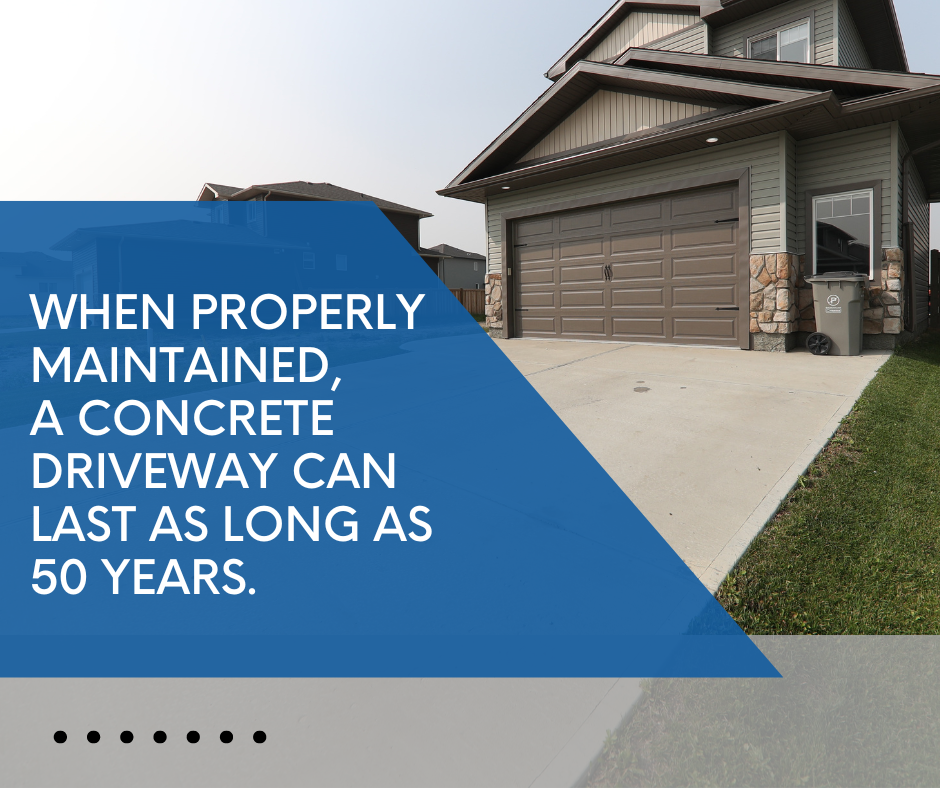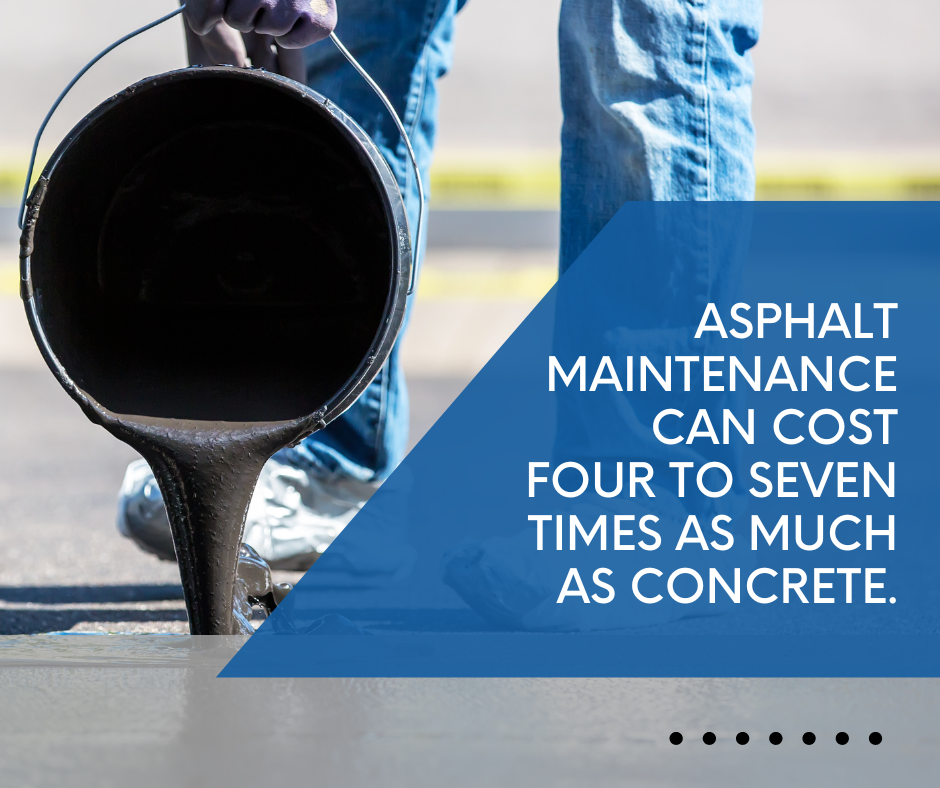Concrete or Asphalt: What is Best for Your Driveway?
Any upgrade to your property can be a complicated decision. When it comes to a new driveway, many wonder about the differences between concrete and asphalt and which one is better. There are many factors that come into play when choosing the right surface such as cost, maintenance, durability, and curb appeal.
With so many things to consider, the decision can feel overwhelming. As one of the largest and most prominent features of your property, your driveway and the materials you choose for it are extraordinarily important. While the decision is ultimately yours, we believe that concrete offers several distinct advantages over asphalt.
Strength and Durability

With a quality installation, concrete is long-lasting. Most homeowners can reasonably expect their concrete driveway to last 25 – 30 years. In addition, when properly maintained, a concrete driveway can last as long as 50 years. Asphalt, on the other hand, has a life expectancy of about 15 years even with regular (and oftentimes costly) maintenance.
Classified as a rigid pavement, concrete is extremely strong. Asphalt is classified as a flexible pavement. The difference between rigid and flexible pavement is how the weight is distributed across the surface. With rigid pavements, the load is distributed over a much larger area than on flexible pavements. Since concrete is a non-flexible material, it’s more resistant to disintegration and distortion due to exposure to the elements and can handle significantly heavier loads than asphalt.
Water
Asphalt driveways can be vulnerable when it comes to puddles and other standing water on their surface. When water such as rain or snow seeps into asphalt through cracks, it pushes the binding elements of the material apart. If this water freezes, it can significantly expand the cracks and cause serious damage. While concrete is also susceptible to water damage, the overall durability of concrete makes it more resistant when it comes to exposure to the elements. No matter which material you choose, it is crucial that your driveway has an adequate drainage system to prevent erosion and minimize water damage.
Heat
All surfaces absorb the sun’s energy which increases the temperature of the surface. This can cause a number of different things to happen to your asphalt driveway including oxidation, cracking, raveling, and tracking. In addition, when it comes to heat, asphalt softens and can evaporate oils up to the surface. This means that asphalt can become sticky and slimy in high temperatures and in certain cases, even adhere to the bottom of shoes. If the shoes are then worn inside your home, the tar-like, black substance could transfer to your carpet or other flooring and potentially cause permanent damage. Without shoes on, asphalt can burn bare feet and the oils it releases could stick to your bare skin, so don’t make the mistake of removing your shoes on your asphalt driveway either!
Extreme and prolonged heat will also take its toll on concrete if it is not maintained properly. If you are in an area with consistently hot weather, your concrete driveway may need a bit more maintenance than those living in less extreme temperatures, however, the life expectancy is still significantly longer for concrete vs. asphalt in high-temperature climates.
Cold
When it comes to cold weather climates, asphalt is actually the winner. While asphalt becomes soft and sticky in the heat, it becomes quite solid in the cold. However, very few people live where the weather is cold year-round. Either material will suffer in extreme cold, but if the proper care is given to it, a concrete driveway will still last longer than asphalt despite asphalt pulling ahead in this category.
Maintenance Requirements
Concrete is virtually maintenance-free. While it is not necessary to seal concrete, doing so will substantially prolong the life of your driveway. Sealer should be reapplied to concrete every 3-5 years. Asphalt will need to be resealed six months after the initial installation and then will need regular resealing every one to three years. Though you can seal asphalt on your own and many people do, driveway sealing preparation can take a full day (including drying time), and it’s tedious. Due to its softer consistency, asphalt deteriorates faster and also tends to need repairs more often than concrete. With both types of materials, cracks should be repaired immediately to prevent further damage.
Financial Considerations
While the cost of asphalt is typically cheaper to install, an asphalt driveway can be expensive to maintain. In fact, due to the frequency of sealing and repairs required, asphalt can cost four to seven times as much money when it comes to maintenance. Though the upfront price of concrete can be intimidating, the longevity of the surface and minimal maintenance it requires over the course of its lifetime can bring a solid piece of mind.

Property Value
With either material, a new driveway will add value to your property. The amount will depend on additional factors such as market conditions and other homes in the area. Another factor, and a very important one, is the quality of the installation. A quality installation is a must when considering a new driveway.
Concrete offers a variety of options when it comes to appearance. Stamped and colored concrete can give your driveway the appearance of bricks, engraved concrete can provide intricate and stunning visual designs, and a simple broom finish can add a slip-resistance surface. Concrete driveway finishes are seemingly endless and can add significant curb appeal and value when properly established.
A newly installed asphalt driveway will also add instant curb appeal. When asphalt is new it is a deep black color with an appealing sheen to the surface. However, there aren’t additional options for decorative finishes with asphalt, and to keep that brilliant black color, it must be sealed frequently.
Installation
The decision to install a new driveway is a big one with a multitude of options to consider. No matter the surface you decide on, Aurora Asphalt & Concrete is here to help you navigate the process. Customer satisfaction is our #1 goal and we take great pride in knowing that you, the customer, are completely satisfied. Whether you are in the beginning stages of your driveway selection and have questions, or you have completed your research and are ready to move forward with the installation, we are here to help. You deserve to come home to quality, and that is what we provide. Contact us today for all of your driveway needs.
